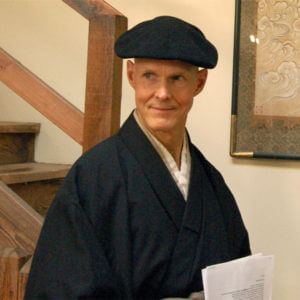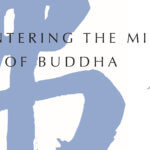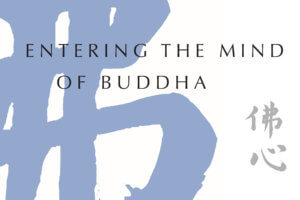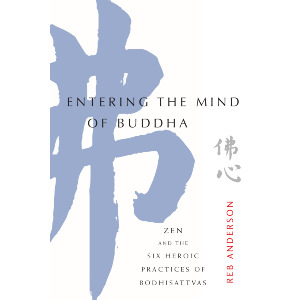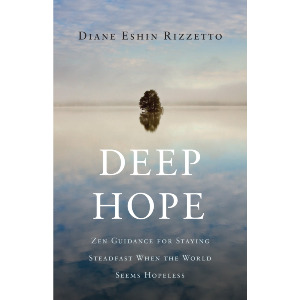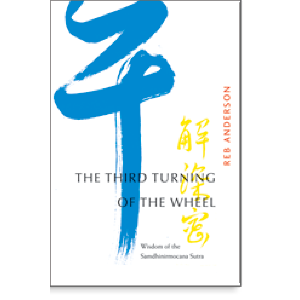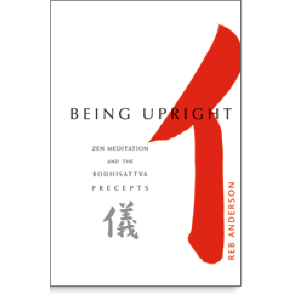An excerpt from Entering the Mind of Buddha
Buddhas are sitting in the midst of fierce flames, turning the wheel of dharma. A ring of fire surrounds every buddha’s meditation seat. Buddhas sit at the center of the suffering of all beings, and they have developed the capacity to be open to boundless suffering. This capacity is the perfection of patience. These flames give off heat and light. They represent both the burning heat of suffering and the opportunity for spiritual illumination. We too sit at the center of all flames of suffering. The inexhaustible expressions of impatience are included in the flames of suffering, in the endless ways of turning away or touching the flames. Turning away, we freeze; touching, we burn.
Impatience takes many forms, including anger, hate, rage, contempt, aggression, disgust, nausea, rejection, aversion, ill will, and violence. The third heroic practice offers us the opportunity to develop the capacity of the buddhas and bodhisattvas to be open and to listen to all the cries of the world. This is how we are practicing together with all buddhas and how they are practicing together with us.
Patience involves learning to be present and upright with all our experiences without turning away or touching. It is our capacity to accept how things really are, and it is necessary for buddha’s wisdom. Developing the capacity to tolerate relative truths warms us up to tolerate ultimate truth.
In our ordinary experience we are challenged with all kinds of hardships, pains, and insults. These challenges offer us many opportunities to practice patience moment by moment. This is the experience we call samsara. It is the world of cyclic birth and death, which is suffering. The experience of samsara lives together with another experience called nirvana, which is peace and freedom. In nirvana there is no birth and no death. In the mature and wholehearted practice of patience in the midst of birth and death, we realize that birth and death and nirvana are one and the same.
Perfecting Patience in the Ocean of Living Beings
As bodhisattvas, we live our life by vows and acts of compassion in the ocean of living beings. In this way, bodhisattvas walk the path of the buddhas. Bodhisattvas learn to be patient and present with the pleasure they may feel when they appear to be skillful or when they get something they think they want. Bodhisattvas also learn to be patient and present with the pain that comes when they are unskillful or when they get something they don’t think they want. To live our lives on the path of the buddhas, we have to let go of our fears of personal suffering and of not being in control of our lives. Otherwise, fear will undermine the bodhisattva life of vow and compassionate action. Fear doesn’t stop us completely, but sometimes it stops us temporarily. We sometimes slip away from acts of compassion into acts that are not generous, ethical, or patient because fear distracts us from our vow to be compassionate.
It is possible to become so concentrated that we enter into an excellent, pleasant place where there is no painful sensation. Buddhist sutras describe certain heavens and states of meditative attainment where there is no discomfort. It is hard to train in patience in those blissful states. Fortunately or unfortunately, those states do not last. If we haven’t trained in forbearance, when we leave those pleasant states and experience pain or insult we can easily lose patience; we might become violent, aggressive, harsh, or just plain crabby.
When we carefully pay attention to our actions of body, speech, and mind through the practice of ethics, we begin to see whether we are patient or not.
In the first paramita, the practice of giving, we focus on welcoming what comes to us and making our practice a gift. In the second paramita, the practice of ethics, we give our attention to being upright and ethical in our actions of body, speech, and mind. These two practices support us now in the practice of becoming patient with the imperfections and discomforts that we experience in our life, including frustration at our own lack of skillfulness. Practicing patience, in turn, deepens our ability to generously offer others the gift of fearlessness.
When we carefully pay attention to our actions of body, speech, and mind through the practice of ethics, we begin to see whether we are patient or not. In one of my earlier books, Being Upright, I wrote this in a discussion about the precept of not harboring ill will: “Patience is an antidote to anger and the primary condition for enlightenment. Through patience your vision clears, and you see the dependent co-arising of pain, frustration, and anger. When you practice patience, the path of harmful anger is blocked. You can face pain and relax and breathe with it.”
Patience is being present with our experience. It’s not turning away or touching. When we can be present with heat and cold, tiredness and sleepiness, or with people attacking us, we develop our capacity to also be present with the emptiness of phenomena. If we are patient, we don’t move toward emptiness, and we don’t turn away from it. We don’t try to control ourselves to prevent turning toward or turning away from anything. This is the activity of generosity functioning within patience. Patience, in turn, protects our generous heart when insults and afflictions come upon us.
Sometimes people confuse patience with self-control. Someone told me that when he feels something unpleasant, he wants to try to control his reaction to it. Sometimes he thinks he is protecting others from his anger in that moment. However, I do not recommend attempting to control ourselves or others. If we think it is a good idea to control ourselves, we may also think it would be a good idea to try to control others. This is not the practice of patience. I recommend instead that, when we find ourselves attempting to control our feelings of fear, anger, or frustration, we remember our wish to be generous, ethical, and patient in our dealings with ourselves and with others. Instead of attempting to control ourselves or others, we return to our aspiration to express an appropriate and compassionate response. Trying to control people and situations is stressful and draining. Being aware of our energy level may help us to notice when our care slips into trying to control. Patient compassion is not draining.
The Three Aspects of Patience
Buddhas teach that patience has three aspects: patience with hardship, patience with harm or insults from sentient beings, and patience with the non-arising of phenomena.
Patience with Hardship
Sometimes it is hard to be upright in the present, in the place where we are, without leaning a little bit away from this place, and without leaning a little bit into thoughts about the past or dreams about the future. When pain comes, sometimes we think, “I can’t take this any longer” or “How long is this going to go on?” When our lives, our relationships, or our jobs seem boring, we often go looking for something more interesting. We try to go away from the present moment when hardship comes in the form of pain or boredom.
Even when we are in pleasant situations, we sometimes lean into imagining pleasure in the future and miss our life in the present. When my daughter was a little girl, she had a friend whose parents were separated. This friend, also a little girl, traveled from Oakland to Boston and Boston to Oakland to be with each of her parents. She had trouble with the hardship of her parents being separated. She said, “When I am with my dad and I’m going to go back to my mom, I am so excited to see my mom that I don’t pay attention to my dad. And when I’m with my mom and I’m going to go see my dad, I get so excited about seeing my dad that I don’t pay attention to my mom.” She understood the sadness of loving her dad and loving her mom and not being fully with either one of them, and she articulated this so well.
This little girl described how it felt by telling another story. She imagined really wanting a Cabbage Patch doll for Christmas, and actually receiving a Cabbage Patch doll. But then somehow the doll gets mixed in with wrapping paper and the whole bundle gets thrown out. Looking for the doll, she can’t find it. Where’s the doll? Maybe it got thrown out with the wrapping paper! So she runs down to the garbage and sees the garbage truck driving away with the Cabbage Patch doll on the roof of the truck. She said that when they find really nice stuff in the garbage, sometimes they put it on the roof of the garbage truck. So she imagined running outside and seeing the thing that she treasured being taken away because she wasn’t really present when she received it. She was so excited opening her presents that she buried the Cabbage Patch doll in all the wrappings, and so she lost it. This little girl could see that what she was doing with her parents was just like that. She actually came up with that example.
It is said that we cannot make a buddha without patience, and we cannot fully practice patience without encountering suffering. Suffering is required to make a buddha. But when we are in pain, we can practice with the smallest possible dose of it. There is a place for pain medication, and there is a friendly way to deal with pain without trying to kill it, control it, or distract ourselves from it. Some of us might say, “I will never be able to do that,” which is a way of saying we think that maybe we can’t become a buddha. It is true that if we cannot become that patient, we cannot become a buddha. But the buddhas’ teachings say that if we practice this way, and keep on practicing, we will become so patient that eventually we will be able to stand anything without feeling ill will toward anybody. If we can be that patient, we can become buddha. In the meantime, we can practice patience and be on the path to buddhahood.
Patience matures and is perfected by being present with our discomfort in the smallest units of time and space.
In the past, during interviews with students, I have sat so long that I have gone beyond my capacity for patience with discomfort. My lack of patience with my own physical pain has sometimes fostered a lack of patience with others. I don’t push myself beyond my endurance anymore, and that helps me be more patient with others.
Patience matures and is perfected by being present with our discomfort in the smallest units of time and space. It is helpful when we try to be present and gracious in each moment of pain, to be with the most present part of the present—that is, to be in the smallest unit of “now.” To be in the present with pain, and to be focused and undistracted in that moment, is patience. We can be really tolerant of pain that way. Through the practice of patience, we can bring our warm heart to each present moment. We can welcome pain and pleasure and insult and praise in each moment.
It is sad when we don’t fully participate in our life. When we feel how sad that is, that sadness is ethics working in us. It’s repentance. This kind of regret encourages us to be more attentive and to return to the practice of patience. When we are trying to generously give ourselves, we can check to see whether we are present. And if we are not present, we may notice that we feel sorrow. Our sorrow says, “At the next meeting, I want to give myself and be fully present.” If we are not present next time, again we feel sorrow. And again, we say, “I wish to be present.” Eventually, when we train in patience, we learn to sit in our seat right in the middle of our life.
Patience with Harm or Insult from Sentient Beings
This is an old story from the Jataka Tales, which are stories told about the Buddha-to-be during his many past lives on the long path to buddhahood. In this story, the Buddha-to-be was called Kshantivadin. Kshanti is a Sanskrit word for patience. The etymology of the word refers to capacity—having capacity, for example, for pain. Kshantivadin means someone who is on the path of patience.
One day a king came with a large retinue into the forest where the yogi Kshantivadin lived, and the monarch and his courtiers had a party there. After the party, the king fell asleep, and his concubines wandered off. They discovered Kshantivadin sitting in a forest glade, and the yogi gave them some teachings about the practice of patience. As he did that, he was also patient with the pleasure of the situation and patient with the beautiful ladies.
When the king awoke, he found the yogi with his concubines, and he felt that Kshantivadin had robbed him. The king became very angry. The concubines begged him, “Please, don’t be angry with this yogi. We thought you were asleep and didn’t need us.” But the king did not listen to them, and he said to Kshantivadin, “What’s your practice, false yogi?” The yogi replied, “My practice is patience.” The king said, “Oh yeah?” and chopped off Kshantivadin’s hands. Then the king said, “Now what is your practice?” Again Kshantivadin responded by saying, “My practice is patience.” Then Kshantivadin provoked the king a little by adding, “You are trying to test my patience but you don’t know where to find it.” The king demanded, “Where is it?” The yogi said, “It’s deep within me.” So the king continued to cut him. Each time, he said, “What’s your practice now?” And the yogi replied calmly, “My practice is patience, but you do not know where my patience lies.” Finally the king stormed, “Where does your patience lie?” Kshantivadin said, “Deep within my heart.” Then the king kicked him and walked away.
Sometimes, people we love and who also love us might do something that hurts us, physically or emotionally. We might be patient with them and not have any ill will toward them, even as we ask them to stop hurting us.
At the time of this story in India, yogis were respected as persons who had great power. The king’s general was afraid that the yogi would use his power to hurt the king, so the general went to the yogi and begged him, “It’s all right if you get angry at the king, but please, do not destroy him.” Kshantivadin replied, “I am not angry. I am not going to hurt him. I only wish the king well.” In the story, Kshantivadin had no ill will for the king who mistreated him. Kshantivadin could have said, “I am not a false yogi. I am not a false practitioner of patience. I am practicing patience, and that is why I do not have ill will toward you or toward the king. No matter what is done to me, I will not have ill will toward anybody.” In this story, Kshantivadin is amazingly, super-humanly, super-divinely patient with insult and physical assault. He did not feel ill will toward the one who administered many insults and abuses. Kshantivadin was able to receive these difficult gifts from the king and to be present with the situation.
I sometimes wonder if somebody cut me up whether I would be able to be patient and generous with that person. We may wonder if we want to be as patient as Kshantivadin was. Being a grandparent is nice, because it’s possible to imagine that if one of your grandchildren accidentally chopped off your fingers, you might be patient and not have ill will toward them. Sometimes, people we love and who also love us might do something that hurts us, physically or emotionally. We might be patient with them and not have any ill will toward them, even as we ask them to stop hurting us.
In the chapter on giving, I told a story of offering my grandson a boundary when he pinched me. The boundary was my gift to him, but it was also part of my practice of patience. Because I was practicing patience with my own discomfort at that time, my asking him to stop was a gift to him. Otherwise, it would most likely have been an attempt to control him. When we are patient with our own pain, we are better able give a boundary or say “no” as a gift, rather than saying “no” out of reactivity or fear.
We may experience insult and disapproval physically in a particular part of our body. When we feel pain in a specific place in our body, we can learn to be present with that sensation. I find that the sensation of pain in my body is a being that is calling for compassionate presence. When I give my compassionate presence to that being who is calling for it there is healing and peace with the pain. We can do this with many different types of pain in different parts of our body. When we do, we are taking care of the pain-filled being in us who is calling for patience.
One of the stories that drew me to Zen was about how one of our Zen ancestors responded to both insult and praise. In this story, Hakuin Zenji was falsely accused of impregnating a young girl who lived in the village near his hermitage. When her parents and the villagers came to accuse him, he said merely, “Is that so?” When the baby was born, Hakuin received the infant and cared for the child with the help of a wet nurse. Sometime later, the girl confessed to her parents that a village boy was the father of her child. Those who had accused him earlier came then to reclaim the child and to praise Hakuin. In response to their praise, he simply said, again, “Is that so?”
Hakuin was patient when they blamed him, and he was patient when they praised him. The story does not say that he did not care that they blamed or praised him. It also does not say that he didn’t feel anything. If it said that he didn’t feel anything, it would make the story much less interesting to me. In this story, Hakuin Zenji was patient with others, he was patient with his feelings when he was blamed, and he was patient with his feelings when he was praised.
Big insults can sometimes be easier to welcome than little ones. Sometimes people find it quite natural to be patient and accepting of the big shocks that come to their lives because they see that trying to control those situations is useless. Sometimes it’s easier to be present with huge shocks because we can see that complaining is a distraction from being patient with our pain. We may be able to say, “I’ve been practicing in preparation for this big one my whole life and here it is. I’m ready to meet this.”
But when little insults come, we may think being patient is not necessary and that complaining is appropriate and will get us what we want. I might say, “I don’t need this. This is ridiculous.” In a way, this is insulting the insult. Sometimes the insults where we forget our practice of patience are very small. For example, if we call a helpline and think that the person who answers should be helpful and we also think that they are not, we may feel justified in being impatient and rude to them. Part of what makes this a difficult situation is that we had an expectation. Being patient with small insults and frustrations in our relationships is at the heart of the practice of patience. In order to have continuity in our practice, we need to be ready to meet both the big and the small frustrations with patience.
Patience with the Non-Arising of Phenomena
Practicing patience with the suffering that arises from hardship and insult is in itself of great benefit to oneself and others. Perhaps its greatest benefit is that it makes us ready for the third kind of patience. It is hard to open to all these forms of suffering in the world of birth and death, but it is even more difficult to open to the ultimate truth of all things.
The Great Perfect Wisdom Heart Sutra says, “All phenomena are marked by emptiness. They neither arise nor cease.” Seeing that they neither arise nor cease is seeing how all phenomena are marked by emptiness. Patient acceptance of the non-arising and non-ceasing of phenomena is a capacity of mature bodhisattvas and buddhas. It is the capacity to open to the ultimate truth of emptiness.
How can we open to the revelation of the ultimate truth of emptiness? It is by opening to the truth of our intimate relationship with all beings. The Lotus Sutra says in chapter 2 that only a buddha together with a buddha can fully realize the truth of all things. This intimate face-to-face transmission of buddha together with buddha is possible when bodhisattvas develop the capacity to be patient with intimacy. Patient acceptance of ultimate truth is the same as patient acceptance of the intimacy of all things.
Share
$18.95 - Paperback
$18.95 - Paperback
$17.95 - Paperback
Warm Smiles from Cold Mountains
$24.95 - Paperback
The Third Turning of the Wheel
$24.95 - Paperback
$19.95 - Paperback
